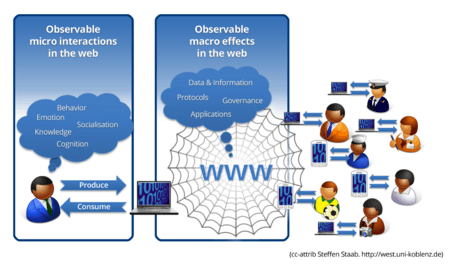Web science
Web science is an emerging interdisciplinary field concerned with the study of large-scale socio-technical systems, particularly the World Wide Web.[1][2] It considers the relationship between people and technology, the ways that society and technology co-constitute one another and the impact of this co-constitution on broader society. Web Science combines research from disciplines as diverse as sociology, computer science, economics, and mathematics.[3]

An earlier definition was given by American computer scientist Ben Shneiderman: "Web Science" is processing the information available on the web in similar terms to those applied to natural environment.[4]
The Web Science Institute describes Web Science as focusing "the analytical power of researchers from disciplines as diverse as mathematics, sociology, economics, psychology, law and computer science to understand and explain the Web. It is necessarily interdisciplinary – as much about social and organizational behaviour as about the underpinning technology."[5]
Research groups
There are numerous academic research groups engaged in Web Science research,[6][7][8][9][10][11][12][13] many of which are members of WSTNet, the Web Science Trust Network of research labs. Health Web Science emerged as a sub-discipline of Web Science that studies the role of the Web's impact on human's health outcomes and how to further utilize the Web to improve health outcomes.[14][15][16][17]
Related major conferences
- Association for Computing Machinery (ACM), Hypertext Conference (HT) sponsored by SIGWEB
- ACM SIGCHI Conference on Human Factors in Computing Systems (CHI)
- International AAAI Conference on Weblogs and Social Media (ICWSM)
- The Web Conference (WWW)
- Association for Computing Machinery (ACM) Web Science Conference (WebSci)
See also
References
- Berners-Lee, T.; Hall, W.; Hendler, J.; Shadbolt, N.; Weitzner, D. (2006). "Computer Science: Enhanced: Creating a Science of the Web". Science. 313 (5788): 769–771. doi:10.1126/science.1126902. PMID 16902115.
- Hendler, Jim; Shadbolt, Nigel; Hall, Wendy; Berners-Lee, Tim; Weitzner, Daniel (2008). "Web science: an interdisciplinary approach to understanding the web" (PDF). Communications of the ACM. 51 (7). doi:10.1145/1364782.1364798.
- "Why Do We Need Web Science Research?". 6 December 2009.
- Shneiderman, Ben (2007). "Web science". Communications of the ACM. 50 (6): 25. doi:10.1145/1247001.1247022.
- "What is Web Science? – Web Science Institute – University of Southampton".
- "WSTNet at RPI: Web Science Research Center". 30 October 2012.
- "웹사이언스 공학". eng.webst.kaist.ac.kr.
- "Institute WeST".
- "E-Business and Web Science Research Group at Bundeswehr University Munich".
- "Education – Web Science Institute – University of Southampton".
- "JKU » Webwissenschaften – Master".
- "New Web Science Institute to explore how the Web will shape our future – Electronics and Computer Science – University of Southampton".
- "UIR Web Science @CEMAM – USJ – Beirut / Lebanon".
- http://www.websci11.org/workshops/health-web-science-workshop/>
- http://www.websci12.org/workshops/health-web-science-workshop
- Luciano, Joanne S; Cumming, Grant P; Wilkinson, Mark D; Kahana, Eva (1 January 2013). "The Emergent Discipline of Health Web Science". 15 (8). doi:10.2196/jmir.2499. PMC 3758025. PMID 23968998. Cite journal requires
|journal=(help) - "Health Web Science". Foundations and Trends in Web Science. 4: 269–419. doi:10.1561/1800000019.
External links
- A Framework for Web Science
- Talk on web science by W3C
- MSc on Web Science at Institute WeST, University of Koblenz-Landau, Germany
- MSc on Web Sciences divided into different branches of study at Johannes Kepler University Linz, Austria
- What is Web Science? (Video clip) on YouTube
- The Web Science Education Workshop
- The Web Science Education Map
- Master's Programme WebScience at Cologne University of Applied Sciences
- The Web Science Institute at the University of Southampton